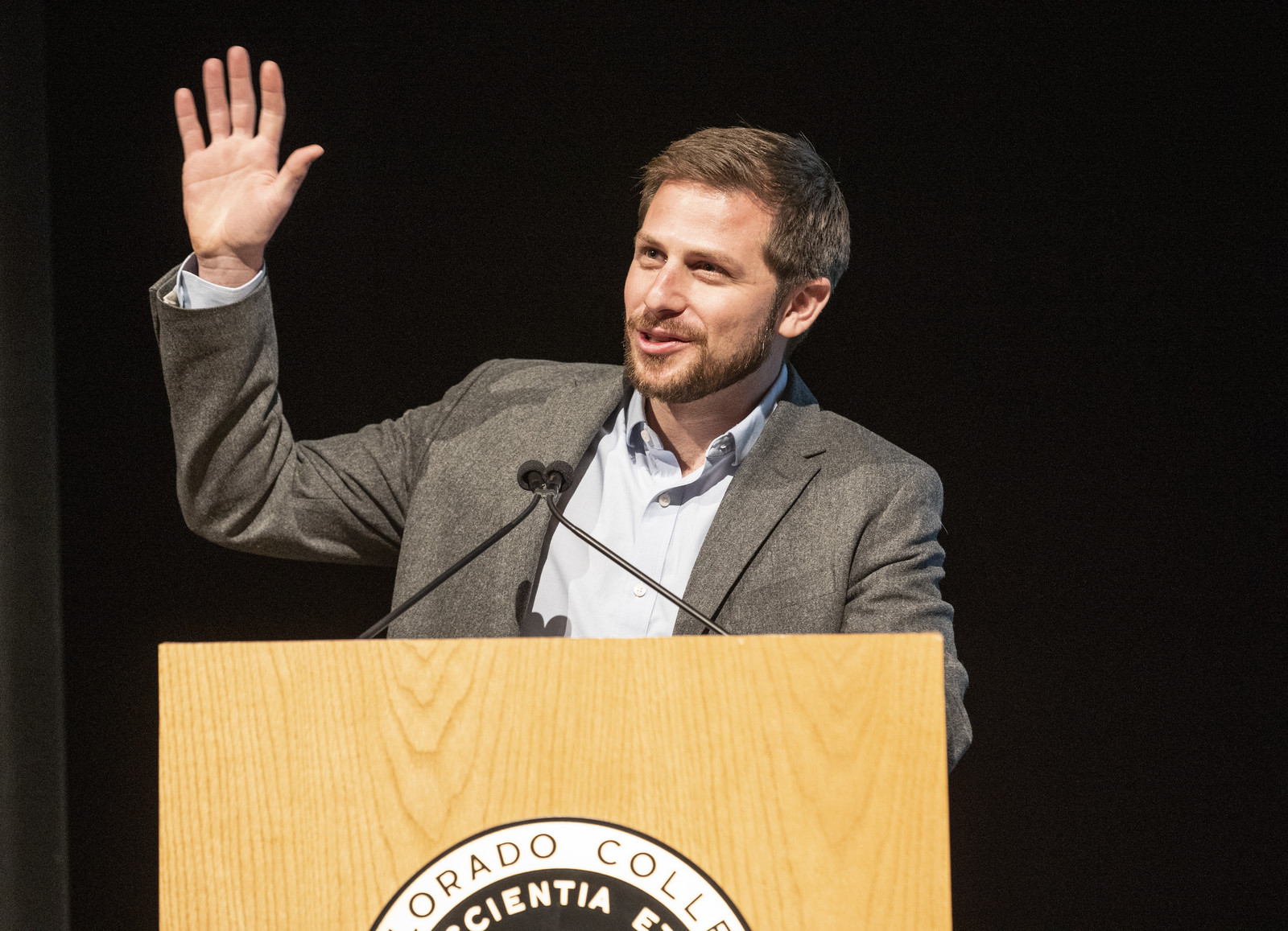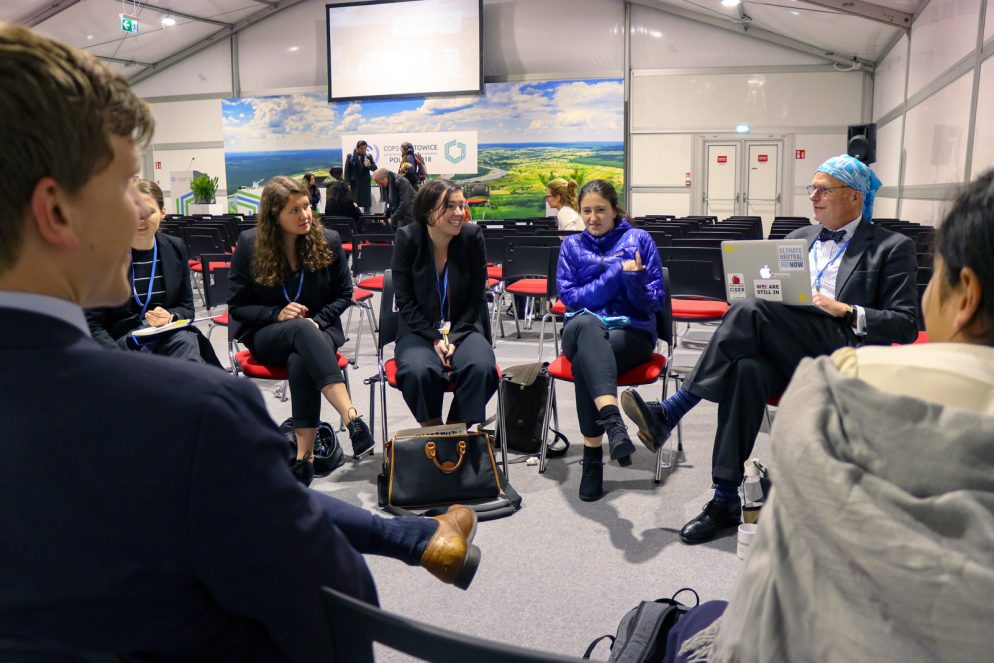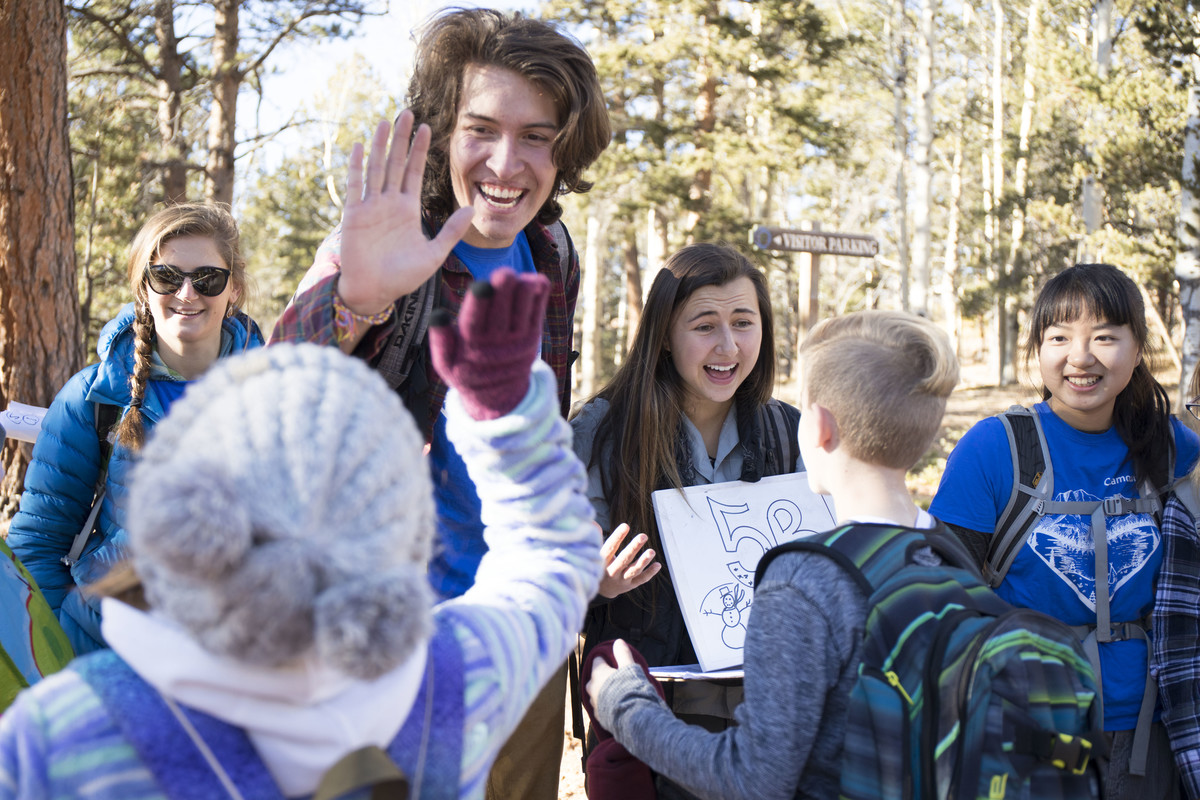Block Six Campus Story
A Snapshot: Academics and Co-Curricular Activities in the Pursuit of Carbon Neutrality and Sustainability Efforts at Colorado College
By: Visiting Assistant Professor Tyler Cornelius, Paige Shetty ''20, Daniel Cortes '22, & Gordon Clark '23
At Colorado College students, faculty, staff, and administrators share the common goal of improving our campus's energy efficiency and making our campus community more sustainable. But beyond these immediate goals, the CC community is committed to teaching and learning about enviro-social questions away from campus-in Colorado Springs, throughout the state of Colorado, in Washington D.C., and beyond. The following stories are just a few examples of how academic and co-curricular activities engage important social and environmental issues away from campus.
Energy
Efficiency
in
the
Houses
around
Colorado
Springs
By: Tyler Cornelius
In Assistant Professor Lynne Gratz's Environmental Thermodynamics (EV212) course, CC students study the physical and chemical principles underlying energy generation and consumption by looking at houses in Colorado Springs. CC students get a detailed look at the advantages and disadvantages of alternative energy sources, and the environmental problems associated with the continued burning of fossil fuels.
At the center of the course is community service. Each time EV212 is offered, enrolled students complete a home energy project on a house in Colorado Springs. In this project, CC students assist a local resident in assessing and then improving the home's energy efficiency, helping provide labor, expertise, and financing for homeowners who might not have the time or resources to improve efficiency on their own. This "hands-on" exercise allows students the opportunity to apply newly acquired knowledge of energy thermodynamics in a practical setting, all while helping local residents implement simple and cost-effective ways to save energy and lower their utility bills.
The "retrofit" project, as this activity has come to be known, began many years ago when now-retired CC Physics Professor Barbara Whitten and current CC Chemistry Professor Sally Meyer were considering ways to help students focus their environmental advocacy close to home. Whitten and Meyer stumbled across the idea of having CC students help conserve energy in our local community - one house at a time. "All the students were interested in protecting wilderness," said Whitten, "They had this real dichotomy, between the beautiful wilderness that we need to protect, and the ugly cities that we don't care about. And I wanted them to focus a little bit more on where we are here, and how cities work." It was Whitten and Meyer who first proposed doing a service project in a CC science course.
Today, the retrofit project is run as a collaboration with the not-for-profit Energy Resource Center (ERC), an organization dedicated to improving residential energy efficiency across the state. Working with Colorado College students allows the ERC technicians to pass on valuable expertise, highlight career opportunities in the skilled trades, and draw attention to small home improvements that can have outsized impacts on energy consumption.
To complete a home retrofit, CC students first work with ERC technicians to conduct a preliminary audit of the house. Using a blower-door and an infrared camera, they search for areas of infiltration, where cold or hot air passes through the walls, floors, ceilings, or windows, resulting in losses in energy efficiency. After conducting the initial audit, students then calculate the energy lost and prepare a plan detailing the changes that could be made, the costs of implementing those changes, and the return on investment that the homeowner might expect. Early in the morning on the day of the project, CC students exit local building stores with cartloads of insulation, weather stripping, energy-efficient light bulbs, and other low-cost but high-impact materials. After transforming the home, students return for a second audit to measure and see if their predictions played out in the real world. They then prepare a report for the homeowner, which they deliver in the form of a public presentation. Over the years, the energy retrofit project has engaged hundreds of students and improved dozens of homes in our local community.
Gratz thinks of that class as one of her favorites because it has so many benefits: "Students get to apply what they are learning in the classroom in a practical, meaningful way, the ERC gains visibility and community partnership, the homeowner gets a free energy upgrade and a new awareness about their home's energy use, and slowly we make a positive impact on energy use in the Colorado Springs community."
Sunshare: A Story of Innovation
By: Daniel Cortes '22

Colorado College prides itself on nurturing innovation among students. Sunshare is an example of what graduates can achieve after leaving CC. . Sunshare is a Denver-based company started by alumnus David Amster-Olszewski in 2011. Originally planning to open shop somewhere in California, Olszewski decided to give it a go in Colorado Springs after being informed by a city council member that new legislation would make it possible to see his vision through here. Initially, it was a success, with many Colorado Springs community members backing and investing in Olszewski's community solar garden. However, a new set of council members the following year decided to roll back legislation, forcing Olszewski to move operations. Sunshare is now based in Denver, Colorado, with a sister headquarters in Minneapolis, where the company has partnered with the energy giant Xcel.
Sunshare affords customers the ability to buy into a community solar garden. Instead of paying to install solar panels on the roof of one's home, a homeowner can pay to rent or own solar panels in a large solar complex. The larger the share a customer owns, the larger the credit they receive on their energy bill each month. Solar gardens are an effective tool for combating climate change because they make renewable energy a feasible choice for individuals, putting the power (no pun intended) in the people, thus circumventing apathetic attitudes demonstrated by some policy makers. This idea has already been popularized in Germany, where Olszewski was introduced to it. He believes that there is great potential for solar gardens to take off in the United States and continues to work to make them available to consumers. Given the increasingly devastating effects of climate change, companies such as Sunshare will need to take off in order to secure the future of life on earth.
COP24: Building Local Leaders for Global Challenges
By: Paige Shetty '20

One of the many challenges in addressing global climate change is knowing where to begin. The problem is global in scale, but some of the greatest impact can be felt and made on the local level. CC has put some of its focus on the local level through our push towards carbon neutrality, but we have also been looking at the bigger picture. Part of that approach has included sending groups of students, faculty, and administrators to the world's most important climate policy negotiations.
The annual United Nations Conference of the Parties, well known as the COP, provides global policy leaders, non-governmental organizations, businesses, and academic groups the opportunity to immerse themselves in intense debate and discussion surrounding global climate change. A number of CC students attended in 2018. While attending the COP, CC students are heavily engaged in conducting research on a topic of their choosing, while also engaging with campus leaders such as the President, the Provost, and the Board of Trustees about CC's role in climate change and its solutions. Upon their return to campus, students are required to act as local leaders to global challenges by engaging the campus in potential climate change solutions. For example, Mahea Daniels '21 chose to engage the campus by inviting Carter Roberts, president and CEO of the World Wildlife Fund, to give a first Monday talk. Others have chosen to pursue senior thesis work centered around finding local solutions to climate change.
CC prides itself on its innovative approach to education, especially as the eighth institution in the U.S to be carbon neutral. The students, faculty, staff, and administrators that involve themselves in our campus' sustainability projects continue to demonstrate what is possible on local, national, and global levels and encourage a campus-wide ethic of environmental sustainability.
TREE Semester at the Catamount Center
By: Tyler Cornelius

One way Colorado College students share their interest in sustainability is through teaching. More specifically, by developing lessons for school-age children from a local elementary school. TREE Semester at the Catamount Center is a CC program that allows undergrads a chance to study environmental education in the field, with an emphasis on sustainability and environmental inquiry. Every fall, a new cohort of CC students heads up to the Catamount Center on the north side of Pikes Peak for a semester-long sabbatical, to live in nature, take courses on environmental education, and ultimately plan and then teach a series of nature-based lessons to kids from a local elementary school.
After the semester is underway several classes of fifth graders head up to the Catamount Center to experience the outdoors up close. The kids come up for five hours at a time, once a week for 10 weeks, to engage in outdoor exploration: They dig in the dirt, explore ponds and streams, and even think about what it would be like to survive on their own, out in the woods, without the comforts of food and shelter. For many of these children it's their first chance to spend substantial time in the forest, and in groups of six or seven they work with CC students to develop an environmental inquiry project of their own - a unit where the kids ask critical questions, explore the environment around them, collect their data, and then present their answers to parents and classmates back at their elementary school. Each group works on a separate and distinct project, and past projects have included collecting bark samples from different tree species, searching for a variety of aquatic organisms in the shallows of a lake, or measuring the benefits of time spent outdoors.
While it's only 26 miles from CC to the Catamount facilities, the area feels as remote as it is beautiful. CC students who go there often feel like they are in a different world - away from the commotion of campus life and the often-frenetic pace of life on the Block Plan. Away from many of the usual distractions that accompany modern life, CC students who participate in TREE value the change of pace. Environmental Science Professor Howard Drossman, one of the program's founders, says the experience is often transformative for undergraduates: "TREE offers an experience different than your typical study abroad experience," he noted, "…it forces a lot of introspection …students are out living in nature and, yes, the dorm is there and there are very comfortable facilities, but students are watching the seasons go and they are not on electronics all the time." Drossman thinks one of the biggest benefits of being away from the college is a special sense of community - something that is true for the professors, the CC students, and the fifth graders. It's this sense of community that defines this local vision of sustainable living.
When TREE is complete, participating undergraduates will have spent over 90 hours with elementary students, and many of the program's past participants see the experience as a highlight of their time spent at CC. "I look at TREE as training future leaders in the environmental education field," said Drossman, "If they end up being fantastic teachers that's great too, but we really think these students are ready to lead us toward a more sustainable future."
Colorado College as a Green Community
By: Gordon Clark '23
The road trip followed a summer of uncertainty. Having not visited Colorado College prior to move-in day, I realized that my father and I were making a 3,000-mile trek from Vermont to Colorado in a Chevy Suburban packed to the brim with belongings and blind faith. I was uneasy on the eve of move-in day; I was a long way from home and I did not know what to expect. The next night, as I closed the door on my first day at CC, I smiled; faith had paid off.
My first semester at CC caught me at my most impressionable. I encountered an attitude surrounding the campus, one that asked good-naturedness of me and every person at the school. The common denominator of everything I have experienced so far at CC has been an emphasis on being a good person - to yourself, to others, to the world we share.
After a semester, I have seen that the good-intentions of CC students run deeper than the interpersonal, but extend to upholding the school's sustainability goals. To see someone neglect a recycling bin or buy a palm-oil product is rare; to see such a person go un-confronted is even rarer. This is not to say that the campus is self-policing; rather, students are held accountable by the example of their peers. This accountability travels from the ground up, from each student to each employee. This translates beautifully to a campus-wide, wholehearted respect of the Earth, which has manifested itself most recently in the carbon-neutrality of campus. I have come to define Colorado College as a community that perpetuates such pioneering, conscientious thought.
